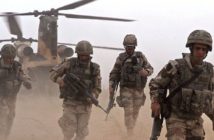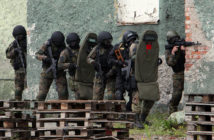Mauritanian President is extending a hand of friendship towards moderate Islam as he prepares for war against extremism.
By Raby Ould Idoumou for Magharebia in Nouakchott
[AFP/Al-Jazeera/HO] Mauritanian President Mohamed Ould Abdel Aziz embraces moderate Islam but rejects extremism.![[AFP/Al-Jazeera/HO] Mauritanian President Mohamed Ould Abdel Aziz embraces moderate Islam but rejects extremism.](http://magharebia.com/cocoon/awi/images/2013/01/04/130104Feature2Photo1.jpg)
Mauritanian President Mohamed Ould Abdel Aziz met with the leaders ofJamaat Dawa wa Attabligh(“Society for Call and Spreading Faith”) last Sunday (December 30th).
The meeting comes as part of Ould Abdel Aziz’s support of what he describes as “moderate Islam”, Mauritanian journalist Moulaye Ould Baheide said.
The consistency of Mauritania’s strategic goals in supporting moderate Islam, which calls for peace, security, countering extremism and terrorism, is a factor serving the policies of the government, which is waging a fierce war against terrorist groups in northern Mali, the analyst added.
He said that Jamaat Dawa wa Attabligh was more attractive for young Muslims after it refused to engage in confrontation with political or religious groups.
Instead, it chose to focus its dawa (preaching) efforts on matters of faith for its young supporters and to urge them to renounce extremism and avoid the kind of jihad that exists in the region.
“The group’s relations with the authorities are relations of participation and construction, and the president’s meeting with the leaders of dawa and clerics serves the Mauritanian strategy for holding dialogue with moderate Islam and at the same time fighting against extremism and terrorism,” Islamic groups expert Zain Al-Abidin Ould Mohamed said.
“At this particular juncture, it is important for Mauritania, which is facing the largest concentration of Salafist extremists on its eastern border, to unify its internal front to send a clear message that the state doesn’t fight Islam but extremism and crime,” he added.
For his part, rights activist and journalist Abeid Ould Imijen said the Mauritanian regime reviewed the conditions and activities of Jamaat Dawa wa Attabligh in an attempt to control its movements and prevent its young members from joining the terrorist groups’ strongholds in northern Mali.
Mauritanian blogger Mohamed Abdou agrees with Ould Imijen and adds that it is also to prepare the Mauritanian political scene for a decision to take part in the war on terrorist groups in northern Mali.
Related Articles
Mali opens probe into preacher slayings
2012-09-14
Failed AQIM assassination spurs Mauritania debate
2011-02-09
Mauritanian president ready for work
2012-11-26
Mauritania moves Salafist prisoners
2011-06-10
Sahel military chiefs weigh options for Mali crisis
2012-07-16
Journalist Cheikh Noah says that the internal crises of the Mauritanian regime make it resort to a group that has a large presence in the Sunni Mauritanian society as an important card that the regime can benefit from in alleviating tensions at the street and close up ranks in order to confront the enemy, namely the terrorist organisations and associated groups, that started to mobilise their forces on the border.
In his turn, Dr Hassan Ould Ahrimo said that the convergence between the Mauritanian government and leaders of moderation was a political behaviour that wasn’t without a message to the public, to the effect that the Mauritanian president doesn’t have a problem with Islamic action as promoted by some.
“The Mauritanian regime’s problem is a political problem with a certain political faction,” he added.
“The tenser the relation is with that faction, the greater the regime’s appetite is for containing other religious groups. This isn’t without financial support to the base of moderate Islam in Mauritania,” he said.
.






